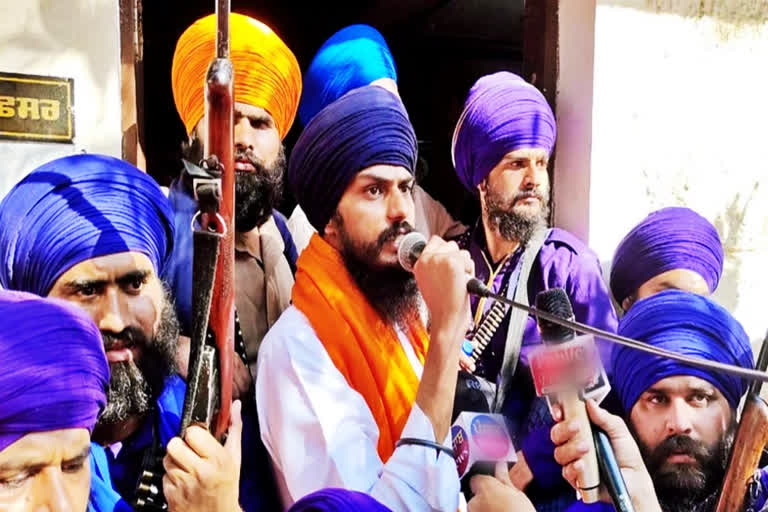Hyderabad: Parading through the streets of Amritsar on Thursday, the enraged Sikhs, armed with kirpans, swords and guns brought back memories of the 1980s when Punjab was overrun by militancy. The agitating protesters attacked the police in Ajnala, forcing them to release Lovepreet alias Toofan Singh, whose arrest had sparked the protest in the first place.
Amritpal Singh, a 29-year-old engineer, with a sound exposure and articulation to influence youngsters of Punjab with slogans of Khalistan, a call for a separate homeland for Sikhs, was the one who had asked his supporters to gather at Ajnala and protest for the release of his close aide Toofan who was arrested on the charges of kidnapping a person.
Having no idea of how the situation would unfold, the police was caught by surprise when the streets of Ajnala were flooded with youth in support of Amritpal’s call. The state security apparatus broke loose against the rioting youth but ended up on the receiving end of it. Punjab DGP announced the release of Toofan Singh on the grounds that he wasn't present at the abduction site.
The DGP's remarks cause people to think about how militant leader Jarnail Singh Bindrawale's release was made possible after his accomplices used violence to put pressure on the then-government authorities, particularly the union government, to free him in 1981. Subsequently, on the floor of the parliament, Zail Singh, the then Home Minister in the Indira Gandhi’s cabinet said that Bindrawale was not responsible for the murder of a newspaper owner for which he had been arrested.
The release of Bindrawale during the bloody incidents in Punjab is viewed as one of the main factors that emboldened pro-Khalistan forces, which ultimately resulted in operation Blue Star and subsequently the assassination of the then-prime minister Indira Gandhi. In order to persuade Sikhs to support a cause of separate homeland, Khalistan, Amritpal Singh, dressed in Bindrawale attire, draws inspiration from his ideology and speaks the same words he did in his days of struggle.
Those at the helm in Punjab don't take this new crop of Sikh separatists, who are apparently commanded by young Amritpal Singh, very seriously. The Punjab Syllabus is written for them, and the old texts can be used to solve any problem is what they probably would be believing. The level of complacence is quite visible after how the situation unfolded following the release of Toofan.
Amritpal’s rhetoric has not come to an end. On Saturday, he again threatened the police in the state of dire consequences if they filed a case against Toofan. It is therefore evident that letting Amritpal free for a while is in the best interest of both AAP and the union government. Otherwise, he would have endured the same fate that people in other places face for defiance. It seems Amritpal’s move will polarise the state and will unify state’s Hindu population given what the Khalistan movement of the 1980s brought to them. It will divide Sikhs to a large extent.
The secular Sikhs will go a neutral way and are likely to remain indifferent to any change in the state. The radical religious Sikhs will choose Amritpal, but the Hindus, who make up 40% of the state's overall population, will not support either AAP or the Congress, leaving them with only the BJP as an option.
The BJP is yet to mark its presence and establish its foothold in the state given its earlier electoral experiences. Now that the party has leaders like Capt. Amarinder Singh, BJP earns a lot of hope that he will make a difference for the party in 2024 elections. Amarinder has lived through the years of Punjab violence. He was, infact, one of the main negotiators representing Indira Gandhi's point of view against Akalis in early 80s.
A new wave of pro-Khalistan rhetoric appears to favour the BJP the most. As Amritpal's rise will only consolidate Hindu votes for the party, Captain and people like him on the other hand will help attract Sikh votes for them. At the same time, Kejriwal is merely trying to keep the situation under control and is dealing with it carefully because he knows that if it gets out of hand, it will not only strip them of their power in the state but also jeopardise further prospects of widening their hands elsewhere after becoming the national party.
The interesting question is whether the ruling party in the centre, which has Ajit Doval-like officials handling security issues, is waiting for the Khalistan movement to pick up steam and support a particular party in the upcoming election or putting a stop to it at the outset before this benign trend turns into malignant epidemic for the people of the state to make them suffer.
Also read: Ajnala incident can have grave ramifications: Amarinder Singh



